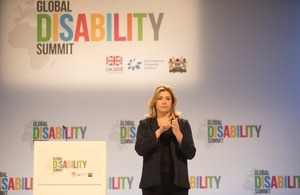Global Disability Summit sparks 170 commitments to tackle stigma and discrimination against people with disabilities
The UK Government’s first ever Global Disability Summit has yielded ambitious commitments from a host of governments and other organisations.

Picture: Michael Hughes/DFID
-
The Global Disability Summit has resulted in 170 ambitious commitments from all over the world to take action on stigma and discrimination against people with disabilities
-
The commitments follow the call to “move from rhetoric to action” from the International Development Secretary, Penny Mordaunt, in the build up to the Summit
-
301 organisations and governments have signed the Charter for Change – an action plan to implement the UN International Convention on Disability
The UK Government’s first ever Global Disability Summit has yielded ambitious commitments from a host of governments and other organisations to tackle discrimination and stigma against people with disabilities.
This comes after Penny Mordaunt, International Development Secretary, called on other governments and donors before the summit to follow the UK’s lead and “stand alongside people with disabilities in their country, commit to ending stigma, and fully value the contribution they can make to the success of their nations”.
Among the most significant pledges made were commitments to pass transformative new laws to protect the rights of people with disabilities, as well as assurances to help those affected by humanitarian crises. There were also commitments to help people with disabilities to access vital technology and work with the private sector around the world to reduce their prices.
- Nine national governments have committed to passing or formulating new or revised laws to give people with disabilities greater rights in the countries in which they live
- 18 governments and other organisations have committed to new action plans on disability inclusion
- 33 governments and other organisations have pledged to specifically support more people with disabilities affected by humanitarian crises – this includes the Australian government who will give $16.4m to support disability inclusive action in response to the Syria crisis
- Nine organisations and governments, including USAID, The World Health Organisation and UNICEF, have, along with the UK, joined the Global Partnership on assistive technology, aimed at transforming access to, and the affordability of, life changing devices and basic technology, like wheelchairs and glasses
Seven UN agencies attended the Summit, and they committed to change the way they include people with disabilities into their work.
For example:
- UNICEF will help an additional 30 million children with disabilities gain a high quality education by 2030 through programmes in more than 140 countries; and 18 governments have committed to improve the way children with disabilities learn and invest in teacher training
- by 2021, 80% of UN Women’s country programmes will include a focus on women and girls with disabilities
- this year, the UN Trust Fund to End Violence against Women will spend $3m on 9 programmes which will reach 8,000 women and girls
And crucially, nine African governments have committed to creating safety nets to ensure that people with disabilities are not forgotten about in their societies. 19 governments, businesses and other organisations have also pledged to develop the skills of people with disabilities and help them access decent work.
International Development Secretary Penny Mordaunt said:
It is fantastic to see such ambitious commitments made from countries and organisations from around the world at today’s Global Disability Summit.
But, if we are going to help people with disabilities to fulfil their true potential, today cannot just be about words – it has to be about action.
That’s why we need to hold ourselves and our partners to account and make sure these commitments produce genuinely transformative results for people with disabilities worldwide.
Notes to editors
You can see a full list of the commitments made at the Summit here.
For images and videos of the stories of people with disabilities around the world go to this link. If used, please credit DFID.
General media queries (24 hours)
Email mediateam@dfid.gov.uk
Telephone 020 7023 0600
If you have an urgent media query, please email the DFID Media Team on mediateam@dfid.gov.uk in the first instance and we will respond as soon as possible.